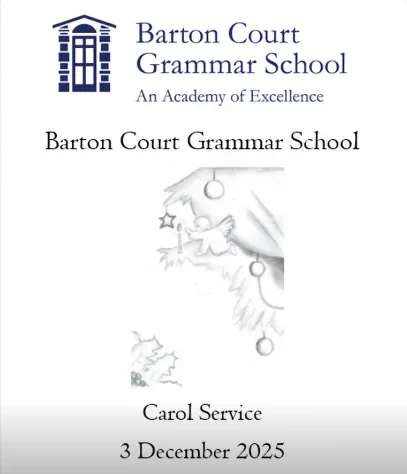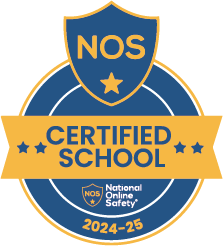Admissions
Sixth Form Admissions Arrangements: September 2026
Barton Court Grammar School is a mixed Sixth Form. The majority of our students in Year 11 continue with their studies into our school Sixth Form and priority will be given to existing students transferring from Year 11 who meet the entrance criteria.
For the intake from September 2024 onwards the Sixth Form will recruit on the basis of a Year 12 of 180. The minimum published admission number (PAN) for new entrants will be 60, however we may enrol above this if there are sufficient spaces on the particular combination of courses requested by suitably qualified applicants.
Priority for places will be:
- Internal applicants - students enrolled in Year 11 of Barton Court Grammar School.
- BCAT Trust applicants – students enrolled in Year 11 in a School within Barton Court Academy Trust (BCAT)
- External applicants
NB Should there not be enough room on a particular course, priority, within each of the categories above, will go to the candidate with the highest average points score across their GCSE subjects.
A place maybe offered where an applicant has extenuating circumstances for not meeting the required GCSE results. Any applicant, who believes this may be the case, should write to the Head of the Sixth Form providing details and any supporting evidence for consideration.
All of our primary courses run for two years with AS Level no longer an option.
To study 3 or 4 Advanced Level subjects over two years we require:
- at least eight grade 4s at GCSEs including English and Mathematics and at least four grade 6’s at GCSE, including a 6 in the subjects chosen where relevant, or in the case of a student not studying the subject at GCSE, a 6 is needed in the closest subject (s) they have studied at GCSE. Further details can be found in the prospectus. The only exceptions are that a grade 7 is required in Mathematics GCSE in order to study A Level Mathematics, and a grade 8 at Mathematics GCSE is required to study Further Mathematics A level.
Barton Court Grammar School also runs a number of BTEC subjects as shown in our prospectus.
To study a single BTEC and two or three A Levels we require:
- at least six grade 4s at GCSEs including English and Mathematics and at least three grade 6’s at GCSE
To study two BTECs (or a double BTEC) and one or two A Levels:
- at least five grade 4s at GCSEs including English and Mathematics and at least two grade 6’s at GCSE
We accept BTEC Level 2 grades where they are related to the subject choice in the Sixth Form with a Merit being equivalent to a GCSE grade 6.
These requirements are based on a professional assessment of the standard of prior attainment needed to be successful (a) in the academic curriculum pathway and (b) in subject specific elements of the vocational pathway.
Application Process
The application process for both internal and external students for the Sixth Form is as follows:
- Application is made through the Kent Choices online website, as part of the Local Authority scheme. For information on how to register an account if not already done, please watch the tutorial video at the following link https://kentprospectus.co.uk/resources/detail/how-to-self-register-an-account-506
All applications will be considered. - Sixth Form Information Evening, or evenings, will be held in January – February preceding the September of entry and will be widely publicised.
- A meeting will be held to discuss options and academic entry requirements for particular courses. A conditional offer letter will be sent to all applicants who are reasonably expected to meet the entry requirements and whose subject preferences can be met. Should it be necessary, alternative subject preferences may be offered. Any conditional offer is made with the assumption that it will prove possible to accommodate the combination of subjects on the timetable, in feasible group sizes. If this does not prove possible the student will be contacted at the earliest opportunity and be offered an alternative.
- A Sixth Form Induction is held at the end of June/beginning July prior to September entry where applicants will be offered the opportunity to attend ‘taster’ lessons and confirm final course preferences.
- For internal students, a confirmation of acceptance by 3:00 pm on the day following the publication of GCSE exam results in August is required in order to secure the conditional offer place. For external students, enrolment will take place on the day following GCSE results day.
Where a student has not met the conditions laid out in their offer letter the school will endeavour to offer alternative courses where possible assuming the student has met the entry requirements for these courses.
Where students have achieved better results than their predicted grades, and therefore now met the entry requirements laid out above, but where previously it was thought they wouldn’t should contact the school by 3.00pm on the day following the GCSE results if they wish to be considered for a place. They will then be considered based on the grades achieved, with a place offered if available. Should a place not be available they will be placed on our waiting list and ranked according to our oversubscription criteria for any places that become available, as a result of other students failing to meet the required entry levels or not taking up their offer of a place.
Over-Subscription
Following the admission of internal students transferring from Year 11, all remaining places will be allocated to learners who have met the entry requirements for the particular course of study. Where there are more learners seeking places than the number of places available, the following oversubscription criteria will be applied in the order set out below to rank pupils until the overall figure for the year group is reached:
- Children in Local Authority Care or who were previously in Local Authority Care – a 'looked after child' or a child who was previously looked after but immediately after being looked after became subject to an adoption, child arrangements, or special guardianship order. A looked after child is a child who is (a) in the care of a local authority, or (b) being provided with accommodation by a local authority in the exercise of their social services functions (see the definition in Section 22(1) of the Children Act 1989).
- Children who are designated as receiving ‘Pupil Premium’ - Applicants under this criterion must complete a Supplementary Information Form (Appendix 3) so that checks can be made to determine eligibility. (For the purposes of this policy, the entitlement to Pupil Premium would need to be shown during the calendar year before entry to Year 12 is sought).
- Current Family Association - a brother or sister attending the school when the child starts. In this context brother or sister means children who live as brother or sister in the same house, including natural brothers or sisters, adopted siblings, stepbrothers or sisters and foster brothers and sisters.
If siblings from multiple births (twins, triplets, etc) apply for a school and the school would reach its Published Admission Number (PAN) after admitting one or more, but before admitting all of those siblings, the LA will offer a place to each of the siblings, even if doing so takes the school above its PAN.
- Health and Special Access Reasons – Medical, health, social and special access reasons will be applied in
accordance with the school’s legal obligations, in particular those under the Equality Act 2010. Priority will be given to those children whose mental or physical impairment means they have a demonstrable and significant need to attend a particular school. Equally this priority will apply to children whose parents’/guardians’ physical or mental health or social needs mean that they have a demonstrable and significant need to attend a particular school. Such claims will need to be supported by written evidence from a suitably qualified medical or other practitioner who can demonstrate a special connection between these needs and the particular school.
- Nearness of children's homes to school - we use the distance between the child’s permanent home address and the school, measured in a straight line using the National Land and Property Gazetteer (NLPG) address point. Distances are measured from a point defined as within the child’s home to a point defined as within the school as specified by NLPG. The same address point on the school site is used for everybody. When we apply the distance criterion for the school, these straight line measurements are used to determine how close each applicant’s address is to the school.
If, in the event, more than one applicant has the same distance from home to school (as measured by the local authority), then a random selection will be applied. In the event that the final place offered from the ranked list falls to a pupil of a multiple birth, the school will offer a place to each of these children who have met the over-subscription criteria.
With reference to the oversubscription criteria please refer to Appendix 1 regarding residency.






























